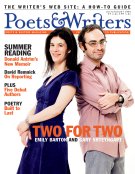Bibliophiles are easy to spot at cocktail parties. They are the ones lingering near the host's bookshelves, their heads cocked at a forty-five-degree angle, scanning the collection of books and comparing it to their own. Tim Spalding, a computer programmer and former employee of Houghton Mifflin, can easily spot them—he's one himself—and, up until last year, he wondered what would happen if bibliophiles could look at other people's books even if they weren't standing in their living rooms. Now he knows: In 2005, he launched a Web site designed to re-create this library-gazing phenomenon online.
LibraryThing has evolved into more than just a handy tool; it has become a thriving community of over thirty thousand book lovers.
Spalding intended LibraryThing (www.librarything.com) to be first and foremost a book-cataloguing Web site, a quick and convenient way for readers to keep track of their collections. His idea was to use the various book databases already on the Web to make the process simple for users. But LibraryThing has evolved into more than just a handy tool; it has become a thriving community of over thirty thousand book lovers. "It's taken off in a way that I couldn't anticipate," Spalding says.
Here's how it works: After setting up a password-protected LibraryThing account, a user can create a catalogue of his collection by entering the ISBN number or Library of Congress call number of each book. LibraryThing gathers information about the book—the title, author, publisher, and, when available, an image of the cover—using data available from Amazon.com and numerous online libraries, including those at Boston University, the University of California, the University of Chicago, and Yale. It then stores the relevant data in the user's catalogue.
Cataloguing the first two hundred books is free. Beyond that, unlimited use of the site for a year costs ten dollars, and a lifetime subscription costs twenty-five. Users can view their books as a list or, if the cover images are available, on a virtual bookshelf; sort their books by author, title, and other criteria; and create a profile page featuring a personal photo, a message board, links to the catalogues of other users, and details about their collections, such as the number of books and the languages they were originally written in. Since it launched in August 2005, forty thousand people have signed up for LibraryThing's services and entered over 2.8 million books into its database. In May, Abebooks.com bought a 40 percent stake in Spalding's Web site.
Whereas some Web sites, such as Friendster and MySpace, promote connections among users through "friends" in common, LibraryThing uses books to connect people. "Thingamabrarians," as LibraryThing's users have dubbed themselves, can find those with whom they share literary tastes and, as Spalding puts it, "hook up with people about pretty obscure stuff."
On each Thingamabrarian's profile page is an automatically generated list of links to fellow users whose libraries have the most books in common with their own. Eric Grunin, a New York–based composer, has entered close to sixteen hundred books into LibraryThing. On his profile page, he can see that one Thingamabrarian has 189 books in common with him, another one, 177; the list continues all the way down to people with whom he has just one book in common. As with other social networking sites, users can post notes to one another's profile pages. Grunin describes the sense of community generated by these interconnected libraries as having a "village intimacy."
As LibraryThing continues to grow—users are cataloguing more than ten thousand books a day—Spalding says that the site's potential as an online forum for serendipitous discovery grows too. "When you find someone that shares ownership of an obscure or meaningful book," he says, "all of sudden every [book] that person has is of interest to you."
C. Max Magee is a writer living in Chicago. He writes about books at the Millions (A Blog About Books).








